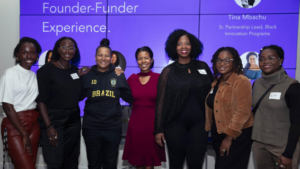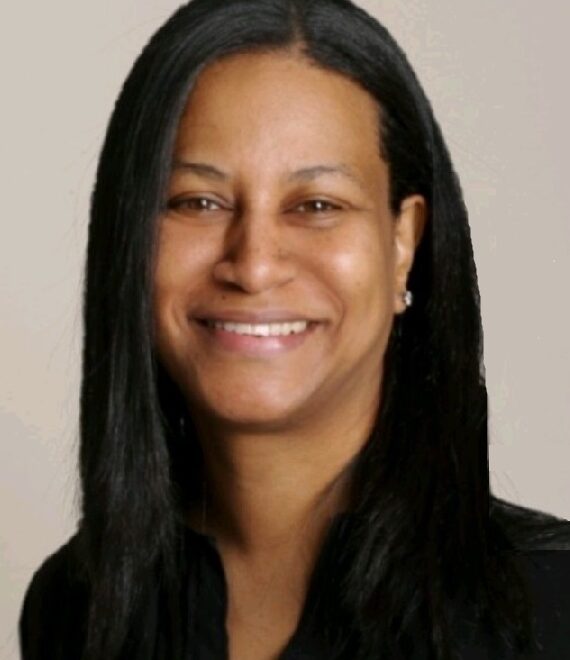Get to know the influential minds behind DMZ’s Women Innovation Summit Steering Committee
In honour of International Women’s Day, DMZ’s annual Women Innovation Summit is designed to empower and celebrate women in entrepreneurship and innovation.
An action-packed event, the Summit will include roundtable discussions, our Women Innovation Pitch Competition for women-led startups to secure funding and the unveiling of DMZ’s Women of the Year award recipients.
We know it takes a village to support women innovators. To bring this Summit to life, we brought together an influential group of leaders, executives and corporate partners to form our Steering Committee. Their role? Ensure a wide range of perspectives, experiences and ideas are considered to reduce bias, support an equitable review process and -— above all else — ensure the Summit reflects the diversity of women that fuels Canada’s innovation economy.
We wanted to give an insider’s look at the individuals behind the Committee to recognize them for the trailblazers that they are.
Without further ado, please meet DMZ’s Women Innovation Summit Steering Committee:
Janet Lin | Vice President, Lending and Payments Technology at Equitable Bank
 A technology strategist with a passion for innovation, digital transformation, diversity and inclusion, Janet Lin is committed to creating human-centric experiences by leveraging technology. She brings over 20 years of experience in digital transformation, technology strategy, software development, customer engagement and AI transformation. She currently works at Equitable Bank, transforming retail and commercial lending businesses with customer-centric, agile decision-making principles enabled by cloud-native technology.
A technology strategist with a passion for innovation, digital transformation, diversity and inclusion, Janet Lin is committed to creating human-centric experiences by leveraging technology. She brings over 20 years of experience in digital transformation, technology strategy, software development, customer engagement and AI transformation. She currently works at Equitable Bank, transforming retail and commercial lending businesses with customer-centric, agile decision-making principles enabled by cloud-native technology.
Janet was inspired to join the Committee to promote, recognize and create innovation opportunities for women in Canada.
Her advice for women entrepreneurs looking to break into tech and innovation?
“Dear women entrepreneurs in technology and innovation, equip yourself with thorough preparation. The path ahead may present challenges, resilience is your friend on this journey. Stay determined, and focused and don’t give up your dreams!”
Magnolia Perron | Indigenous Women and Youth Program Manager at the National Aboriginal Capital Corporations Association
 An advocate for entrepreneurship and economic development for Indigenous communities, Magnolia Perron has worked with various Indigenous non-profits, including the BC Association of Aboriginal Friendship Centres and the First Nations Information Governance Centre, where she has led advocacy, research and program development. Today, she oversees programs dedicated to Indigenous women and youth at the National Aboriginal Capital Corporations Association. Magnolia is from Tyendinaga Mohawk Territory and is a proud member of the Mohawks of the Bay of Quinte.
An advocate for entrepreneurship and economic development for Indigenous communities, Magnolia Perron has worked with various Indigenous non-profits, including the BC Association of Aboriginal Friendship Centres and the First Nations Information Governance Centre, where she has led advocacy, research and program development. Today, she oversees programs dedicated to Indigenous women and youth at the National Aboriginal Capital Corporations Association. Magnolia is from Tyendinaga Mohawk Territory and is a proud member of the Mohawks of the Bay of Quinte.
Magnolia was inspired to join the Committee because of her deep-rooted commitment to fostering diversity and inclusion. She believes that diverse perspectives lead to better innovation and is keen to contribute to an initiative where women can thrive, network and find support for their endeavours.
How does she envision the Summit shaping the future landscape for women in tech and innovation?
“The Summit has the potential to break down barriers, promote equality, and ultimately contribute to a future where women play an integral role in shaping the landscape of technology and innovation. It’s a catalyst, and by showcasing successful women leaders and entrepreneurs, we can inspire the next generation to pursue careers in the industry.”
Peter Bowie | Independent Director, Former CEO of Deloitte China and DMZ Advisory Council Member
 Peter Bowie is an Independent Director of Magna International and a DMZ Advisory Council member. He is a celebrated industry leader with a diverse background in corporate governance, leadership, and advisory roles. He has held prominent positions in organizations such as Uranium One, Deloitte Canada, and Deloitte China, where he served as CEO and Senior Partner. With a focus on innovation and entrepreneurship, Peter is also an investor and advisor in early-stage startup companies.
Peter Bowie is an Independent Director of Magna International and a DMZ Advisory Council member. He is a celebrated industry leader with a diverse background in corporate governance, leadership, and advisory roles. He has held prominent positions in organizations such as Uranium One, Deloitte Canada, and Deloitte China, where he served as CEO and Senior Partner. With a focus on innovation and entrepreneurship, Peter is also an investor and advisor in early-stage startup companies.
Peter was inspired to join the Committee because he’s passionate about encouraging and supporting women entrepreneurs in their journey to success. He believes initiatives like the Summit will enhance opportunities for women in the tech ecosystem.
How does he envision the Summit shaping the future landscape for women in tech and innovation?
“I hope that the Women Innovation Summit, along with other DMZ initiatives dedicated to women entrepreneurs, fosters a culture where women feel empowered to pursue their dreams and where the broader community recognizes the importance of supporting their endeavours in the tech ecosystem.”
Megan Munro | Digital Commerce Strategic Initiatives Lead at Scotiabank
 A high-velocity strategic decision-maker who brings 20+ years of experience in digital initiatives, Megan Munro is a dynamic leader who has managed winning teams in fashion, telecoms, sports and entertainment, airlines and banking. Today, she oversees digital commerce strategic initiatives at Scotiabank, where she champions a collaborative and data-driven approach to deliver inspired solutions.
A high-velocity strategic decision-maker who brings 20+ years of experience in digital initiatives, Megan Munro is a dynamic leader who has managed winning teams in fashion, telecoms, sports and entertainment, airlines and banking. Today, she oversees digital commerce strategic initiatives at Scotiabank, where she champions a collaborative and data-driven approach to deliver inspired solutions.
Megan was inspired to join the Committee because she’s passionate about supporting initiatives that promote, encourage and enable equity in innovation. She believes the Summit embodies this passion and is committed to recognizing standout, inspirational women driving innovation and change.
Her advice for women entrepreneurs looking to break into tech and innovation?
“Go for it. Have confidence in your skill set (there is no one like you!), stay curious with a lifelong learning mindset, advocate for yourself and assemble your hype squad with a trusted mentor and people who will cheer you on.”
Jennifer Chiang | Business Development: Canada Lead for Accelerators, Incubators & Seed VCs at Amazon Web Services
 A serial founder, a former soldier in the Canadian Army Reserves and an active mentor and advisor, Jennifer Chiang is a pioneer in influencer marketing, founding a technology that powers the top Fortune 500 brands and reaches over 98M consumers worldwide. She currently works at AWS Startups and continues to share her legacy and mentorship with early-stage founders and partners.
A serial founder, a former soldier in the Canadian Army Reserves and an active mentor and advisor, Jennifer Chiang is a pioneer in influencer marketing, founding a technology that powers the top Fortune 500 brands and reaches over 98M consumers worldwide. She currently works at AWS Startups and continues to share her legacy and mentorship with early-stage founders and partners.
Jennifer was inspired to join the Committee because she’s committed to giving back to the community, a value her mentor Bonnie Foley Wong instilled in her.
Her advice for women entrepreneurs looking to break into tech and innovation?
“Strive to always be on the edge of the miraculous.”
Moshe Mikanovsky | Product Director at RootQuotient

Moshe Mikanovsky, a product management leader with a background in engineering, applies a lean, iterative approach to developing products that exceed users’ expectations. At RootQuotient, he supports companies of all sizes, from startups to corporates, build digital products. An entrepreneur at heart, Moshe founded Products for Good, a social initiative for aspiring product managers to learn the craft while building products to help humanity.
A proud father of three daughters, Moshe is an advocate for women’s empowerment and women in tech. His personal experiences as a father have fueled his dedication to supporting his daughters in finding their career paths. This led him to join the Committee to ensure the ecosystem nurtures and promotes women’s advancement in technology and beyond.
How does he envision the Summit shaping the future landscape for women in tech and innovation?
“One of the most important things we can do as an ecosystem is profile success stories to inspire other women and young girls. Having a national spotlight and funding up for grabs for women-led startups can support women founders tremendously, but above all else, being connected to a community like DMZ’s can work wonders.”


 “Unlike traditional staffing methods, which are usually biased, expensive and time-consuming, Spotwork is a cost-effective solution with cutting-edge technology and a streamlined hiring process. Our platform facilitates seamless matchmaking between skilled individuals and businesses.
“Unlike traditional staffing methods, which are usually biased, expensive and time-consuming, Spotwork is a cost-effective solution with cutting-edge technology and a streamlined hiring process. Our platform facilitates seamless matchmaking between skilled individuals and businesses.  “Our platform has been designed with fairness and impartiality in mind. It utilizes algorithms that select the best candidates for job opportunities without bias.
“Our platform has been designed with fairness and impartiality in mind. It utilizes algorithms that select the best candidates for job opportunities without bias. 



